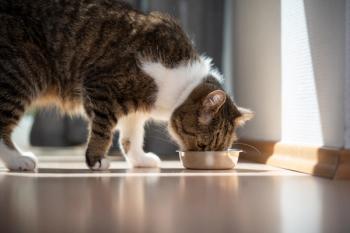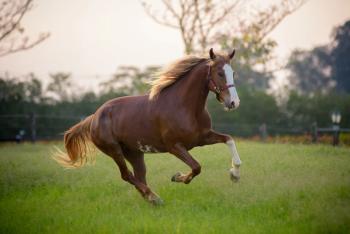
Consortium mulls big farming's impact to environment, health
Washington - Past government officials, environmentalists, industry leaders and even actress-turned-activist Daryl Hannah want to contribute to what's being billed the most comprehensive study on agriculture's impact to date.
WASHINGTON — Past government officials, environmentalists, industry leaders and even actress-turned-activist Daryl Hannah want to contribute to what's being billed the most comprehensive study on agriculture's impact to date.
The $2.6-million, two-year study is sponsored by Pew Charitable Trusts and directed by the Johns Hopkins Bloomberg School of Public Health's National Commission on Industrial Farm Animal Production. The project probes the effects of large-scale animal farms on the environment, public health and animal welfare. Preliminary findings might even impact the 2007 rewrite of the U.S. Farm Bill, experts say.
Representing veterinary medicine are University of Tennessee veterinary college dean Dr. Michael Blackwell and Colorado State University (CSU) ethicist Bernard Rollin, PhD. At presstime, the commissioners were scheduled Nov. 1 to convene in San Francisco for their third meeting. Following a minimum of eight public hearings, the panel will make recommendations and list its findings in a comprehensive report, tentatively scheduled for release in early 2008.
While Blackwell characterizes the reports' overall impact on veterinary medicine as minimal, the profession likely will be challenged on its animal welfare stances such as those that condone controversial animal confinement practices.
"I think we are going to be looked to for leadership, and we'll have to make a choice where we stand on some of these issues. I believe those impacts will definitely be felt," he says.
The American Veterinary Medical Association (AVMA), the profession's largest membership body that draws up model welfare standards, likely will not play a role. "They're not going to be ignored, but we all know AVMA represents AVMA, not everyone. That's just a reality," Blackwell says.
Diverse body
Yet the group's across-the-board makeup fails to alarm the former assistant surgeon general, who appears honored by the invitation. "Too often our profession is missing in action on these larger issues. The fact that we're sensitive to political issues is no reason to shy away," Blackwell says.
Still, he's concerned more veterinarians aren't represented. Former Michigan State University dean Dr. Lonnie King who now works at the Centers for Disease Control and Prevention bowed out due to a conflict of interest involving the agency. So instead of DVM colleagues, Blackwell shares ideas with Dan Glickman, secretary of agriculture under President Bill Clinton and Thomas Hayes, president of Cargill Meat Solutions Corp. as well as a handful of activists and religious leaders. Former Kansas Gov. John Carlin chairs the group.
While industry hardliners express concern that the study panel might have a liberal slant, Blackwell takes such trepidation in stride.
"In my opinion we can't be diverse and then not welcome participation from people who have extreme positions. Our profession has caught a lot of flack for doing that," he says. "But it's pretty clear that the researchers were looking for veterinarians with a public health perspective. It's because the public health question is the biggest and most important issue to date."
'Tall order'
Rollin, CSU philosophy, physiology and bioethics professor, labels the heterogeneous group as "smart and open-minded." In fact, the commission takes the first objective look at confinement agriculture to date, he says.
"There's a whole list of problems we're going to try to look at in an informed way," Rollin says. "The main point is there's a lot of interchange and a lot of exploration going on. Most of these people are not ag people so they're coming at it as intelligent outsiders without bias."
According to Johns Hopkins, subject matter might include production agriculture's impact on zoonotic disease threats such as avian influenza, the effects on rural communities and environmental concerns such as contamination from waste.
"I think everybody stands to gain knowledge, and these are topics we ought to better understand," Blackwell says. "Most likely we'll have more confined feeding operations than fewer. We just need to get to the future in the best state that we can."
Panel members to explore health and environmental impact of industrial farm animal production as part of study
Panelists include:
- Brother David Andrews, CSC, JD, executive director, National Catholic Rural Life Conference; member, Iowa Food Policy Council
- Fedele Bauccio, MBA, co-founder and CEO, Bon Appétit Management Company
- Dr. Michael Blackwell, DVM, MPH, dean, College of Veterinary Medicine, University of Tennessee; assistant surgeon general, U.S. Public Health Service
- Tom Dempster, state senator, South Dakota
- Rev. Richard Garcia, DD, auxiliary bishop of Sacramento, Diocesan Pastoral Center; member, Board of Directors of the National Catholic Rural Life Conference
- Dan Glickman, JD, chairman and CEO of the Motion Picture Association of America; former Secretary of Agriculture
- Alan M. Goldberg, PhD, professor, Johns Hopkins Bloomberg School of Public Health; director, Center for Alternatives to Animal Testing
- Daryl Hannah, actress; advocate for biofuels and environmentally sustainable lifestyles
- John Hatch, DrPH, Kenan professor emeritus, Health Behavior and Health Education, University of North Carolina at Chapel Hill School of Public Health
- Thomas Hayes, president, Cargill Meat Solutions Corp.
- Deirdre Imus, president and founder, The Deirdre Imus Environmental Center for Pediatric Oncology; co-founder and co-director of Imus Ranch, a working cattle ranch for kids with cancer
- Dan Jackson, rancher; member, Confederated Salish and Kootenai Tribes; former president, Western Montana Stockgrowers Association
- Frederick Kirschenmann, PhD, distinguished fellow, Leopold Center for Sustainable Agriculture, Iowa State University; served on USDA National Organic Standards Board
- James Merchant, MD, DrPH, Dean, University of Iowa College of Public Health; leading expert on occupational and environmental health, rural health, and public health policy
- Marion Nestle, PhD, MPH, Paulette Goddard professor, Department of Nutrition, Food Studies and Public Health, New York University
- Bill Niman, cattle rancher, founder and chairman of Niman Ranch Inc.
- Bernard Rollin, PhD, distinguished professor of philosophy, Colorado State University; scholar in animal welfare.
Source: Johns Hopkins Bloomberg School of Public Health
Newsletter
From exam room tips to practice management insights, get trusted veterinary news delivered straight to your inbox—subscribe to dvm360.






